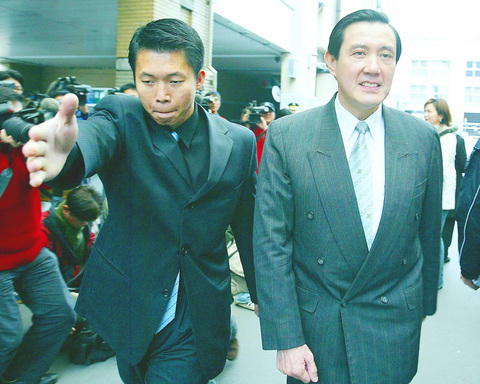Hong Kong should offer the Taiwanese people a reasonable explanation as to why it refused to issue a visa to Taipei City Mayor Ma Ying-jeou (
"We feel sorry about what happened to Mayor Ma and would like to point out that the incident clearly signifies the deterioration of Taiwan-Hong Kong relations and that the Hong Kong government should be held fully responsible for it," Cabinet Spokesman Chen Chi-mai (陳其邁) told a press conference held after the weekly Cabinet meeting yesterday morning.

PHOTO: CNA
While it remained unclear as to why the government of the Hong Kong Special Administrative Region rejected Ma's visa application, speculation was rife that it was related to Ma's recent criticism of the "anti-secession law" the Chinese government is drafting.
Ma said that he himself did not know why the Hong Kong government rejected his visa application and that it would be a very "unwise decision" if it was because of his criticism of the "anti-secession law."
"Maybe the Hong Kong government doesn't want me to go because it's too cold," he said jokingly.
"If it had something to do my remark about the law, it would run counter to the Chinese government's intention to convince the Taiwanese people to trust the `one China, two systems' model," he said.
When asked whether he considered the incident to be suppression by the Chinese government, Ma said that he did not think so, but "it sure feels upsetting to be black-listed" by the Hong Kong government.
"Honestly speaking, I'm very much shocked by the fact that I cannot go back to my birthplace to attend a cultural activity related to city affairs," he said.
Hong Kong's Ming Pao Daily News quoted unidentified government officials as saying that Ma's visa was denied because he recently criticized China's proposed anti-secession law.
The paper added that the timing of Ma's visit would be too sensitive as China's legislature prepares to vote on the law in March.
Taiwan contends that the measure could be used as a pretext for an attack.
Ma has visited Hong Kong twice since the former British colony returned to Chinese rule in 1997. The politician is popular in Hong Kong because he was born there.
Ma favors eventual unification with China, and has been critical of President Chen Shui-bian's (陳水扁) efforts to create a new Taiwanese identity separate from China's. Chen is reviled by Chinese leaders.
Timothy Wong, a researcher at the Institute of Asia-Pacific Studies at Chinese University of Hong Kong, said Ma's visa was rejected because Chinese authorities want to stamp out any ``inappropriate'' remarks on the planned anti-secession law.
"Beijing is escalating its pressure to the utmost level. There is no gray area," he said.
He added that China rejected Ma's visit to make clear that tensions across the Taiwan Strait remain serious.
"They don't want to send the message to the outside world that the severe situation of cross-straits relations has improved," he told a radio talk show yesterday.
According to a CNA story last night, Hong Kong's Constitutional Affairs Bureau director Stephen Lam (

An essay competition jointly organized by a local writing society and a publisher affiliated with the Chinese Communist Party (CCP) might have contravened the Act Governing Relations Between the People of the Taiwan Area and the Mainland Area (臺灣地區與大陸地區人民關係條例), the Mainland Affairs Council (MAC) said on Thursday. “In this case, the partner organization is clearly an agency under the CCP’s Fujian Provincial Committee,” MAC Deputy Minister and spokesperson Liang Wen-chieh (梁文傑) said at a news briefing in Taipei. “It also involves bringing Taiwanese students to China with all-expenses-paid arrangements to attend award ceremonies and camps,” Liang said. Those two “characteristics” are typically sufficient

A magnitude 5.9 earthquake that struck about 33km off the coast of Hualien City was the "main shock" in a series of quakes in the area, with aftershocks expected over the next three days, the Central Weather Administration (CWA) said yesterday. Prior to the magnitude 5.9 quake shaking most of Taiwan at 6:53pm yesterday, six other earthquakes stronger than a magnitude of 4, starting with a magnitude 5.5 quake at 6:09pm, occurred in the area. CWA Seismological Center Director Wu Chien-fu (吳健富) confirmed that the quakes were all part of the same series and that the magnitude 5.5 temblor was

The brilliant blue waters, thick foliage and bucolic atmosphere on this seemingly idyllic archipelago deep in the Pacific Ocean belie the key role it now plays in a titanic geopolitical struggle. Palau is again on the front line as China, and the US and its allies prepare their forces in an intensifying contest for control over the Asia-Pacific region. The democratic nation of just 17,000 people hosts US-controlled airstrips and soon-to-be-completed radar installations that the US military describes as “critical” to monitoring vast swathes of water and airspace. It is also a key piece of the second island chain, a string of

The Central Weather Administration has issued a heat alert for southeastern Taiwan, warning of temperatures as high as 36°C today, while alerting some coastal areas of strong winds later in the day. Kaohsiung’s Neimen District (內門) and Pingtung County’s Neipu Township (內埔) are under an orange heat alert, which warns of temperatures as high as 36°C for three consecutive days, the CWA said, citing southwest winds. The heat would also extend to Tainan’s Nansi (楠西) and Yujing (玉井) districts, as well as Pingtung’s Gaoshu (高樹), Yanpu (鹽埔) and Majia (瑪家) townships, it said, forecasting highs of up to 36°C in those areas